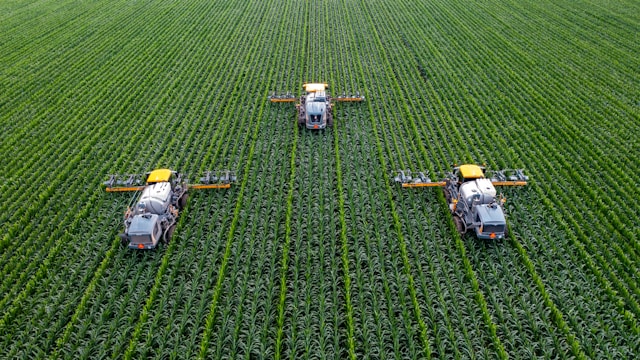In recent years, the agricultural sector has been undergoing a significant transformation driven by the urgent need to address environmental concerns, ensure food security, and adapt to changing climate conditions. This transformation is characterized by the rise of sustainable agricultural practices, which prioritize the long-term health of ecosystems, the well-being of farmers, and the resilience of food systems. In this article, we will explore the key drivers behind the adoption of sustainable agriculture, the principles that underpin these practices, and the positive impacts they are having on both local communities and the global environment.
The Need for Sustainability in Agriculture:
The traditional methods of agriculture, characterized by intensive use of chemical fertilizers, pesticides, and monoculture cropping, have led to a range of environmental problems, including soil degradation, water pollution, and loss of biodiversity. Moreover, climate change is exacerbating these challenges, with extreme weather events becoming more frequent and unpredictable. In this context, the need for sustainable agricultural practices has never been more urgent.
Drivers of Change:
Several factors are driving the shift towards sustainable agriculture. First and foremost is the growing recognition of the environmental and social costs associated with conventional farming methods. Consumers are becoming increasingly concerned about the origin and production methods of their food, leading to a rise in demand for sustainably produced products. In response to this demand, many farmers are embracing sustainable practices as a way to differentiate their products in the market and enhance their brand reputation.
Government policies and regulations are also playing a crucial role in promoting sustainable agriculture. Many countries are implementing measures to incentivize farmers to adopt environmentally friendly practices, such as organic farming, agroforestry, and integrated pest management. These policies often include financial incentives, technical assistance, and support for research and development.
Principles of Sustainable Agriculture:
At its core, sustainable agriculture is guided by a set of principles aimed at minimizing environmental impact, conserving natural resources, and promoting social equity. These principles include:
Soil Health:
Sustainable agriculture prioritizes the health of the soil as the foundation of a productive and resilient farming system. Practices such as crop rotation, cover cropping, and minimal tillage help to build soil organic matter, improve soil structure, and enhance nutrient cycling.
Biodiversity Conservation:
Sustainable farmers recognize the importance of biodiversity in maintaining ecosystem balance and resilience. They incorporate diverse crop rotations, intercropping, and the preservation of natural habitats to support a wide range of plant and animal species.
Water Management:
Efficient water use is essential for sustainable agriculture, particularly in regions prone to drought and water scarcity. Techniques such as drip irrigation, rainwater harvesting, and soil conservation measures help to optimize water resources and reduce wastage.
Pest and Disease Management:
Instead of relying solely on chemical pesticides, sustainable farmers employ a variety of integrated pest management IPM strategies to control pests and diseases. These may include biological control methods, crop diversification, and the use of natural predators.
Climate Resilience:
Sustainable agriculture seeks to build resilience to climate change by adopting practices that enhance soil moisture retention, reduce greenhouse gas emissions, and mitigate the impacts of extreme weather events. Examples include agroforestry, conservation agriculture, and carbon farming.
Impacts of Sustainable Agriculture:
The adoption of sustainable agricultural practices is yielding positive outcomes across multiple dimensions:
Environmental Benefits:
By reducing reliance on synthetic inputs and promoting natural resource conservation, sustainable agriculture helps to mitigate soil erosion, water pollution, and greenhouse gas emissions. It also contributes to the preservation of biodiversity and the restoration of degraded ecosystems.
Economic Viability:
Contrary to the perception that sustainable farming is less profitable, many studies have shown that it can be economically viable and even financially rewarding in the long term. By reducing input costs, improving soil fertility, and enhancing crop resilience, sustainable practices can increase farm profitability and resilience to market fluctuations.
Social Impacts:
Sustainable agriculture has the potential to improve the livelihoods of farmers and rural communities by providing stable incomes, creating employment opportunities, and fostering community resilience. Additionally, by prioritizing fair labor practices and equitable access to resources, sustainable farming contributes to social justice and empowerment.
Case Studies:
Several successful examples of sustainable agriculture initiatives illustrate the transformative potential of these practices:
The Rodale Institute in the United States has been conducting long-term research on organic farming methods since the 1940s, demonstrating the benefits of regenerative agriculture for soil health, crop yields, and carbon sequestration.
The SRI (System of Rice Intensification) method, developed in Madagascar, promotes sustainable rice cultivation through practices such as transplanting young seedlings, reducing water use, and enhancing soil fertility. SRI has been shown to significantly increase rice yields while reducing input costs and greenhouse gas emissions.
The Fair Trade certification program ensures that farmers receive fair prices for their products, adhere to environmental standards, and invest in community development projects. By promoting sustainable farming practices and empowering small-scale producers, Fair Trade has helped to improve the livelihoods of millions of farmers worldwide.
Conclusion:
The rise of sustainable agricultural practices represents a paradigm shift in the way we produce, distribute, and consume food. By embracing principles of environmental stewardship, social responsibility, and economic viability, sustainable agriculture offers a pathway towards a more resilient, equitable, and sustainable food system. As we confront the challenges of climate change, resource scarcity, and food insecurity, the importance of sustainable agriculture cannot be overstated. It is not merely a trend or a niche market; it is a necessity for the future of our planet and generations to come.



